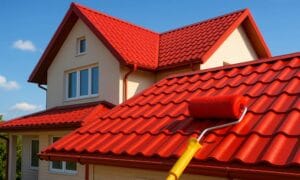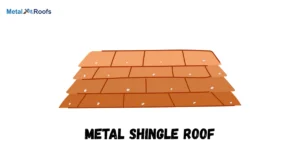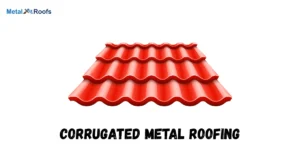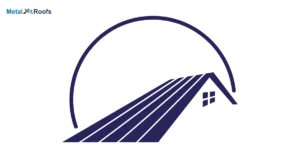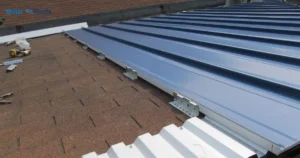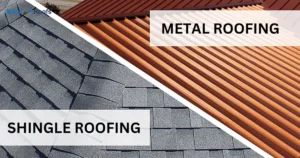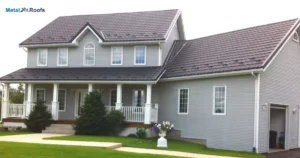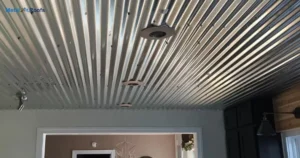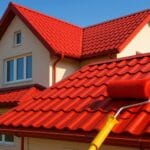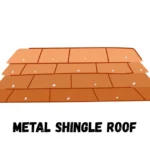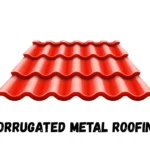Metal roofs have a higher density than other roof types, which can interfere with radio signals, reducing indoor cell reception the more layers and thickness in the metal roof, the greater chance signals get blocked or bounce off it instead of penetrating inside.
Metal roofs are popular. But some wonder, does a metal roof affect cell service? The materials may interfere with signals. Thick metal can weaken reception. It bounces around radio waves. Tests show less bars inside. So a metal roof impacts cell service.
To address signal interference caused by the metal roof on your shed, consider installing drip edge. Metal roofs, with their dense materials, often block signals, leading to reception issues. The addition of a drip edge can help minimize these disruptions, improving overall signal reception inside the shed.
Key Takeaways
- Metal roofs generally don’t block cell signals.
- Impact depends on metal type and thickness.
- Modern signals (4G, 5G) are less affected.
- Thicker metals may have a small impact.
- Proper installation can mitigate issues.
- Location and distance to towers matter.
Do Metal Roofs Affect Wi-Fi and Phone Call Signals?
Metal roofs can impact Wi-Fi and phone signals. The metal can absorb and reflect signals, causing interference. This interference may result in slower internet speeds and dropped calls. If your Wi-Fi router or cell tower is far away, the impact can be more noticeable.
To improve signal quality, consider relocating your router or adding signal boosters. Installing antennas on the exterior of your home can enhance signal strength. Keep in mind that metal roofs don’t completely block signals, but they can affect the overall connectivity. Adjustments and enhancements to your setup can help mitigate these signal disruptions.
Roofing Material Affects Cell Phone Reception

The type of roofing you have can mess with your phone signal. Metal roofs are the culprit here. They block signals like a superhero deflecting bullets. So, if you’re wondering why your calls drop like it’s hot, blame the metal above.
Tiles and shingles, on the other hand, play nice with signals. They don’t mess with your phone mojo. So, next time you’re chilling under your metal roof and your friend’s call goes poof, remember to blame it on the roof.
How Metal Roofs Disrupt Cell Phone Reception?
Metal roofs can mess with your cell signal. The problem lies in the metal’s ability to block signals. When you’re under a metal roof, the cell waves struggle to pass through. This interference leads to dropped calls and slow data. It’s like the metal roof is playing hide and seek with your phone signal.
The waves can’t find their way, causing frustration for anyone trying to make a call or browse the internet indoors. If you’ve ever wondered why your bars disappear under that metal roof, now you know metal roofs and cell signals just don’t get along.
Other Roofing Materials That Can Block Cell Phone Reception
When choosing roofing materials, consider their impact on cell phone reception. Metal roofs, like steel or aluminum, can sometimes disrupt signals, making your calls drop or data slow. Similarly, reflective coatings on roofs may create signal interference. Before installing, check if your selected materials affect connectivity.
Another factor is green roofing with plants. While eco-friendly, thick vegetation can weaken cell signals passing through layers. If maintaining good reception is vital, explore alternative roofing options. Opt for materials that won’t compromise your connection, ensuring you stay connected without interruption.
Improving Your Cell Phone Reception
Boost Your Signal:
Is your phone signal acting up? First, check your location. Move near a window or open space for better reception. If you’re indoors, avoid thick walls or metal structures.
Update Settings:
Dive into your phone settings. Switch to 4G or LTE for faster data speeds. Turn on airplane mode for a quick signal reset. Lastly, consider a signal booster a simple device that amplifies your cell signal for clearer calls and faster internet.
What Causes a Poor Cell Phone Signal?

A weak cell phone signal often results from distance and obstacles. Your phone communicates with a nearby tower, but if it’s far away, your signal weakens. Physical barriers like buildings, hills, or even dense trees can also disrupt the signal. Electronic interference is another culprit.
Devices emitting signals on similar frequencies, like Wi-Fi routers or other phones, can cause interference. In urban areas with many signals, this interference is more common. Weather conditions, like storms, can affect signal strength. Rain, snow, or even dense clouds can absorb or scatter the radio waves, making it harder for your phone to connect.
How to Improve Cell Phone Signal in Your Home?
Check Signal Bars: Start by checking your phone’s signal bars. If they’re low, move to a different spot in your home where the signal is stronger.
Change Location: Find the optimal spot for your phone. Walls and obstacles can weaken signals, so try being near a window or move closer to the cell tower direction.
Give your signal a boost with a Cell Phone Signal Booster
Enhance your signal instantly with a Cell Phone Signal Booster. Say goodbye to dropped calls and slow data speeds. Boost your connectivity at home or on the go. Enjoy clear calls and faster internet effortlessly.
The lifesaver if you have no signal at home?
Enter the Wi-Fi calling feature, your lifesaver in the dead zone. Just connect to Wi-Fi, and voila Make calls and send texts even when your cellular signal plays hide-and-seek. It’s your home’s secret signal superhero, ensuring you stay connected, no matter how remote your spot is.
Take Advantage of your Wi-Fi Network
Maximize your Wi-Fi potential. Choose an optimal router location. Avoid interference from electronic devices. Secure your network with a strong password. Regularly update router firmware. Enjoy seamless connectivity.
Boosting Your Phone Signal
If your phone signal is weak, try moving to a different location. Walls and obstacles can interfere with reception. Use Wi-Fi calling when available for a stronger connection. Consider a signal booster for improved signal strength at home.
Use A Signal Booster
If your cell signal is weak, get a signal booster. It boosts your signal strength. Easy installation, improves call quality. Say goodbye to dropped calls.
Change Providers
Switching providers can be a breeze. First, compare options. Look for better rates and perks. Then, make the switch. Update info and enjoy the change. It’s that simple.
Switch To Thinner Walls
Opting for thinner walls in your home has advantages. They save space, make rooms feel more open, and cut construction costs. Thin walls can enhance natural light, providing a brighter atmosphere.
Advantages Of A Metal Roof
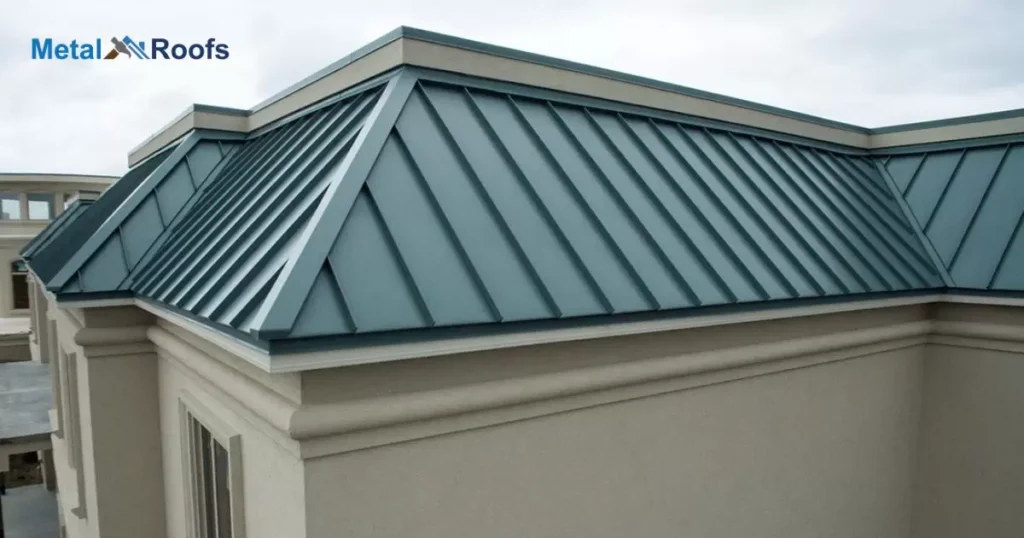
| Advantages of a Metal Roof |
| Durable and Long-lasting |
| Can withstand harsh weather conditions |
| Energy-efficient |
| Reflects the sun’s rays |
| Promotes lower energy bills |
| Requires fewer repairs and replacements |
| Cost-effective solution in the long run |
| Stands up to the elements |
Metal roofs bring numerous advantages to homeowners. First, they’re durable and long-lasting. Metal can withstand harsh weather conditions, including heavy rain and snow, without losing its integrity. This durability means fewer repairs and replacements, saving you money in the long run.
Second, metal roofs are energy-efficient. They reflect the sun’s rays, preventing excessive heat absorption and keeping your home cooler. This reduces the need for constant air conditioning, resulting in lower energy bills. With a metal roof, you get a sturdy and cost-effective solution that stands up to the elements while promoting energy savings.
Cell Phone Signal Booster
A cell phone signal booster can help improve your cell signal. It works by amplifying weak signals. You place an antenna outside to capture the signal. Then it boosts and rebroadcasts the signal inside your home.
Metal roofs and thick walls can block cell signals. A signal booster can fix this problem. It gives you better call quality and faster internet. Many people find them useful in rural areas or large buildings.
Antenna Booster For Cell Phone
An antenna booster for a cell phone helps improve signal strength. It captures weak signals outside and amplifies them inside. This is useful in areas with poor reception. You can use it in homes, offices, and cars. Installation is simple and quick. The booster includes an external antenna and an internal unit.
Better signal means fewer dropped calls. It also speeds up data connections. This makes browsing and streaming smoother. The booster can cover large areas, depending on the model. It is a practical solution for signal issues. Enjoy reliable cell service with an antenna booster.
Does A Metal Roof Attract Lightning?

A metal roof does not attract lightning. Lightning hits the highest point, regardless of the material. Metal conducts electricity, so it safely channels the lightning to the ground. This protects the building.
Metal roofs are safe in storms. They do not increase the risk of a lightning strike. Instead, they reduce fire risk. Metal will not ignite from lightning. It provides a safe path for the electrical charge to the earth.
Cell Booster For Home
A cell booster for home can improve your cell signal. It catches the weak signal outside. Then it boosts the signal inside your house. This helps if you have a metal roof or thick walls. You can enjoy clearer calls and faster data.
Setting up a cell booster is simple. Place the antenna outside where the signal is strongest. Connect it to the booster inside your home. The boosted signal will cover your whole house. This solution works for most carriers and phone types. Enjoy better cell service today.
Frequently Asked Questions
What is the disadvantage of a metal roof?
Metal roofs, while durable, have a notable downside noise. When rain or hail hits, the sound on metal can be loud, disrupting peace inside. In heavy storms, this can be a drawback for those seeking a quieter abode.
Do metal roofs affect WIFI?
Metal roofs can impact WiFi signals. The metal can reflect and absorb wireless signals, reducing the strength and range of your WiFi. If your router is inside, signal strength may decrease, but moving it closer to your devices can help improve connectivity.
Does metal block cell phone signals?
Metal blocks cell signals, causing drops in connectivity. Buildings, elevators, and metal cases can weaken your phone’s connection. It’s like trying to talk through a wall—metal is the culprit.
Conclusion
Metal roofs can reduce cell signals. The dense, layered materials interfere with radio wave penetration. Signals bounce off instead of transmitting through. This causes weaker indoor reception. Installing an internal repeater helps capture and rebroadcast signals.
While metal roofs impact cell service, solutions exist. Adding exterior antennas can grab signals before blockage. Boosters and repeaters inside are rebroadcast to devices. Or use a wireless network for calling and data. With the right equipment, reliable service is

